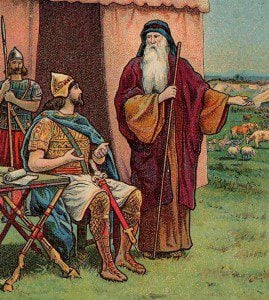The Danger of Listening to People More Than to God
March 23, 2017 Year A
1 Samuel 15:10-21
Have you ever tried to listen to God and actually knew for sure what He wanted you to do? How can you tell if you are being obedient to God’s desire? How do you know if you have done wrong or right by God?
The first responsibility for church leadership is to listen to God and not the people. Ignoring this responsibility can have serious consequences.
In this case, we have a king who thought he was doing the right thing. Saul attacks the Amalekites. Instead of destroying all of the property, Saul takes some of the livestock and sacrifices it to God in worship.
“Saul answered, “The troops brought them from the Amalekites and spared the best sheep and cattle in order to offer a sacrifice to the Lord your God, but the rest we destroyed.”” (1 Samuel 15:15, HCSB)
The problem is that God told the prophet, Samuel, that Saul is not following God’s commands.
“Then the word of the Lord came to Samuel, “I regret that I made Saul king, for he has turned away from following Me and has not carried out My instructions.” So Samuel became angry and cried out to the Lord all night.” (1 Samuel 15:10–11, HCSB)
Saul claims that he has obeyed God.
“When Samuel came to him, Saul said, “May the Lord bless you. I have carried out the Lord’s instructions.”” (1 Samuel 15:13, HCSB)
Yet, in one of the most comical statements in Scripture, Samuel knows otherwise.
“Samuel replied, “Then what is this sound of sheep and cattle I hear?”” (1 Samuel 15:14, HCSB)
How does Samuel know that he is right and Saul is wrong? Because that is the key here. One has listened to God and another has not. God told Samuel to tell Saul to kill everything.
“Now go and attack the Amalekites and completely destroy everything they have. Do not spare them. Kill men and women, children and infants, oxen and sheep, camels and donkeys.’ ”” (1 Samuel 15:3, HCSB)
Samuel and Saul both heard God’s direction. Yet, we discover that although Saul had good intentions, he chose to listen to other people over God’s instruction. Why did Saul do that? We see that Saul blamed the troops for his disobedience.
“The troops took sheep and cattle from the plunder—the best of what was set apart for destruction—to sacrifice to the Lord your God at Gilgal.”” (1 Samuel 15:21, HCSB)
Why did he do that? When we dig deeper into the context, we see that Saul passed the responsibility of following God onto his subjects. It seems that he delegated his work to other leaders and he assumed that they would follow his commands.
““But I did obey the Lord!” Saul answered. “I went on the mission the Lord gave me: I brought back Agag, king of Amalek, and I completely destroyed the Amalekites. The troops took sheep and cattle from the plunder—the best of what was set apart for destruction—to sacrifice to the Lord your God at Gilgal.”” (1 Samuel 15:20–21, HCSB)
Saul was responsible for killing the people and his troops were responsible for destroying the property.
Something must have happened when the troops were destroying the property. Maybe the troops were starving, or maybe they got greedy. Word comes back to Saul of a possible rebellion and mutiny of the troops. To appease them, he lets them keep some of the property that was to go to God. We know this because when Saul is confronted, he eventually confesses to his fear of the people.
“Saul answered Samuel, “I have sinned. I have transgressed the Lord’s command and your words. Because I was afraid of the people, I obeyed them.” (1 Samuel 15:24, HCSB)
He feared the people more than he feared God.
The mistake that Saul made, and that church leaders make is to listen to the desires of the people over the direction of God. God gave a strong clue of this direction by revealing His direction for Saul to Samuel. When God tells Samuel that He regrets letting Saul be the leader of Israel, Samuel knows that something is wrong with Saul. This is the reason he prays all night for Saul.
““I regret that I made Saul king, for he has turned away from following Me and has not carried out My instructions.” So Samuel became angry and cried out to the Lord all night.” (1 Samuel 15:11, HCSB)
Samuel knows that Saul has disobeyed God’s direction. When Samuel confronts Saul about not destroying all of the plunder, we see Saul push back.
“So why didn’t you obey the Lord? Why did you rush on the plunder and do what was evil in the Lord’s sight?” “But I did obey the Lord!” Saul answered. “I went on the mission the Lord gave me: I brought back Agag, king of Amalek, and I completely destroyed the Amalekites.” (1 Samuel 15:19–20, HCSB)
But then Samuel reveals more of what God told him. He knows that Saul is dealing with a rebellion and instead of quashing it, Saul agrees to their demands. This is why Samuel instructs him about obedience.
“Then Samuel said: Does the Lord take pleasure in burnt offerings and sacrifices as much as in obeying the Lord? Look: to obey is better than sacrifice, to pay attention is better than the fat of rams. For rebellion is like the sin of divination, and defiance is like wickedness and idolatry. Because you have rejected the word of the Lord, He has rejected you as king.” (1 Samuel 15:22–23, HCSB)
The descent of King Saul’s reign can be traced to this experience. When a leader makes listening to people over God’s voice a priority, a similar descent will follow.
Phot0 courtesy of Wikipedia.














